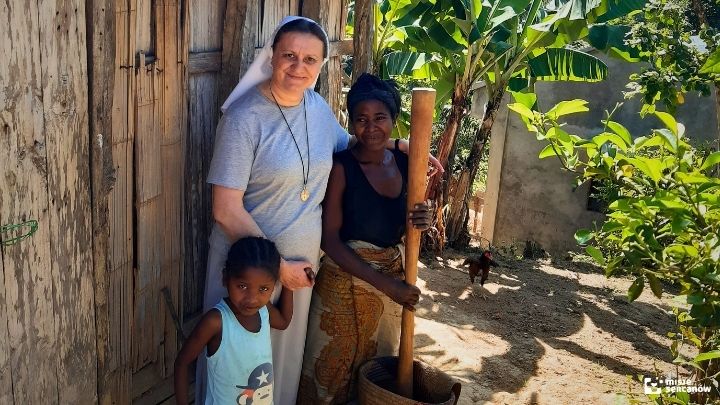Madagascar - an island the size of France and Belgium combined - is a country extremely rich in natural resources, culture, biodiversity, and traditions. Yet, most of its 27 million inhabitants live in poverty. Young people are often unemployed after finishing school, and corruption and theft are commonplace. The situation is particularly difficult in the southern and eastern regions of the island, where water, food, and prospects are scarce, and illiteracy is as high as 60%.
In the Nato-Vohipeno region, 620 kilometers from the capital, a mission run by the Franciscan Missionaries of Mary has been operating since 2014. There are currently four sisters serving there. Their presence is an “oasis of hope” for the local community – a place where people find help, understanding, and genuine care for others.
For them, a missionary is someone who can solve all problems – someone who knows everything and can help, or at least listen and offer advice
- says Sister Wladyslawa Piróg FMM, a missionary in Madagascar.

The school, run by the Franciscan Missionary Sisters of Mary in Nato, was originally designed for 80 students. Today, it serves more than 500 children. Faced with growing needs, it became necessary to expand the facility by adding six new classrooms, a teachers' residence, and sanitary facilities. Renovations of existing buildings and the school playground are also planned, along with the installation of solar panels and the purchase of a one-year supply of rice for the school canteen.
Solar panels are our only chance to access electricity and lighting at the school. And the playground? For our students, it’s often their only form of recreation in their free time! A house for teachers is essential, because we’re simply facing a shortage of teaching staff in our area. Few people are willing to work in rural villages. Providing housing is the only way to attract and retain qualified teachers.
-1758031783.jpg)
An important part of missionary work in Nato is a school feeding program for children. Over time, the sisters noticed that many students were arriving at school hungry, often without breakfast, after walking 2 to 4 kilometers from their homes. Sick, weakened, and unable to concentrate, these children struggled academically. After visiting the villages, the sisters realized the truth: the children were simply hungry. That’s why, in 2021, a feeding program was launched. At first, it was just a small piece of cassava - but always gratefully received.
Shortly after I arrived at the mission, a little girl fainted at school. In a panic, I carried her on my back to the health center. The doctor looked at us with pity and said: “Sister, before you bring your child here, ask the little one first whether she had anything for breakfast—or when she last ate at all.” It turned out that little Michelle hadn’t eaten anything... for two days.
Today, the existing school canteen serves around 200 children, but the sisters hope to expand that number to 300. Those who can afford it contribute a symbolic amount for lunch, around 30 cents. This money helps pay for one cook. The sisters also grow vegetables in the garden for the canteen. However, frequent natural disasters, especially cyclones, often destroy the crops, and the entire school must still be fed.
-1758031825.jpg)
The mission in Nato is located in an area where Catholics are still few, and religious congregations are rare. The Lazarist Fathers, who regularly visit the mission, celebrate Mass two to three times a week. On other days, the Franciscan Sisters lead prayers, involving the schoolchildren and forming prayer groups.
Unfortunately, the current church is in a very poor condition, it’s made of wood, full of holes, and vulnerable to cyclones. Rain pours through the roof, and bats have made the building their home. Still, during cyclones, the church becomes a place of refuge for the local community, just like the school canteen. These are the only elevated structures where people can seek shelter. The greatest desire of the Catholic community in Nato, shared by the sisters, students, and local residents, is to build a new, dignified church that can become the spiritual heart of this part of the island.
To make this ambitious plan a reality and renovate the mission in Nato, Madagascar, we need to raise €119,560. We believe that, with the help of thousands of beautiful hearts beating in the Heartland Missionary Family, this is truly possible!
Bank account numbers for money transfers are:
For $: PL 52 1600 1462 1847 3641 5000 0009; SWIFT: PPAB PLPK
For €: PL 41 1600 1462 1847 3641 5000 0013; SWIFT: PPAB PLPK
For others: IBAN: PL 79 1600 1462 1847 3641 5000 0008; SWIFT: PPAB PLPK



